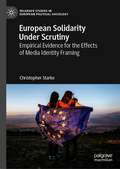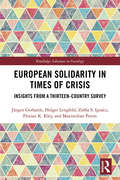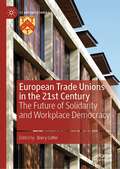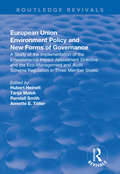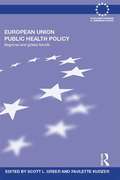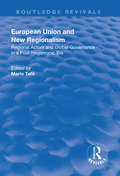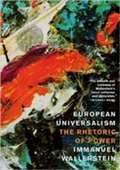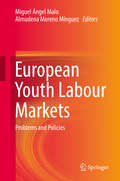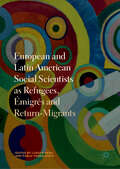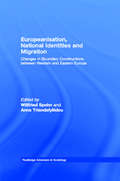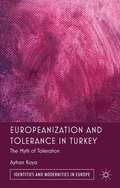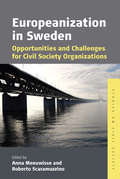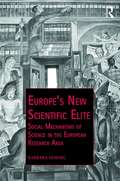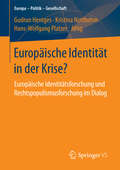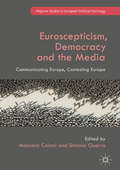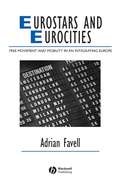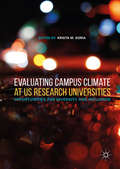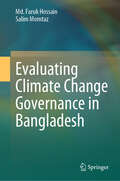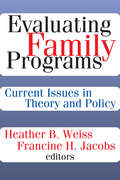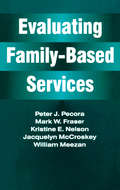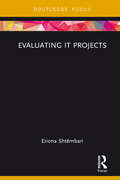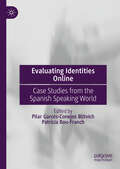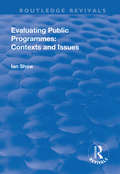- Table View
- List View
European Solidarity Under Scrutiny: Empirical Evidence for the Effects of Media Identity Framing (Palgrave Studies in European Political Sociology)
by Christopher StarkeThis book explores the processes through which European solidarity is constructed. More specifically, it investigates how the media's framing of European identity can facilitate and/or impede the emergence of European solidarity on the individual level. Through an online experiment that tested the effect of two different media identity frames on individual solidarity during the European debt crisis, the author argues that the exposure to news articles using a value-based identity frame boosts solidarity compared to an economic identity frame. This interdisciplinary work will be of interest to scholars of political sociology, political communication and political psychology, as well as any researchers who study European integration.
European Solidarity in Times of Crisis: Insights from a Thirteen-Country Survey (Routledge Advances in Sociology)
by Jürgen Gerhards Zsófia Ignácz Holger Lengfeld Florian K Kley Maximilian PriemThe euro crisis, several sovereign debt crises, the Great Recession, the refugee crisis, and Brexit have all challenged Europeans’ willingness to show solidarity with other European citizens and member states of the European Union. European Solidarity in Times of Crisis provides a clear theoretical framework to understand European solidarity for the first time. It offers a systematic empirical approach to determine the strength and causes of European solidarity. The authors distinguish between four domains of solidarity and test a set of theoretically derived criteria with a unique dataset to investigate European solidarity. Based on a survey conducted in thirteen EU member states in 2016, the empirical analysis leads to some unanticipated results. Europeans display a notably higher degree of solidarity than many politicians and social scientists have presumed so far. This especially applies to the support of people in need (welfare solidarity) and the reduction of territorial disparities between rich and poor EU countries (territorial solidarity), but also to the domain of fiscal solidarity (financial support of indebted EU countries). This optimistic view is less true for the domain of refugee solidarity. While citizens of western and southern EU countries accept the accommodation of refugees and their allocation between European countries, the majority of people in eastern European countries do not share this point of view. The book will appeal to students and scholars in fields such as comparative sociology, political science, social policy and migration research, and European studies. It is also relevant to a non-academic audience interested in the development of the European project.
European Trade Unions in the 21st Century: The Future of Solidarity and Workplace Democracy (St Antony's Series)
by Barry ColferTrade unions in Europe face a range of cross-cutting challenges. This includes the near-universal contraction in union membership; the related decline of traditionally highly unionised blue-collar industries; and the rise of automation, microprocessing, and digitalisation, which can make it cheaper for employers to invest in machines than to pay humans to work. The breakdown of the standard contract of employment and increasing rates of precarious work have further transformed the world of work. Taken together, this makes any collectivist vision of society, and the notion of solidarity upon which trade unionism is built, difficult to sustain.All this raises tough questions for trade unionists, policy-makers, and researchers alike regarding the future of trade unions, the oldest and largest civil society movement in Europe. The contributions in this volume explore the prospects for union revival across a range of cases, including by focusing on the pursuit of legal remedies and on the opportunities associated with the network society to defend the interests of workers. This interdisciplinary volume includes contributions that consider the Czech Republic, Denmark, France, Finland, Germany, Spain, Sweden, Poland, the United Kingdom, and the EU level by researchers coming from a range of disciplines and backgrounds. The volume should especially appeal to researchers and practitioners working in the fields of political science, sociology, law, and business studies.
European Union Environment Policy and New Forms of Governance: A Study of the Implementation of the Environmental Impact Assessment Directive and the Eco-management and Audit Scheme Regulation in Three Member States (Routledge Revivals)
by Hubert HeineltThis title was first published in 2001. Outlining the results of a three-country study, this text examines the impact of EU policy on the domestic, political and institutional environment. It tests ideas about new forms of governance that reflect the values of participation and empowerment of local interests, particularly through a close scrutiny of the environmental impact process. The book also analyzes the responses of the business sector in three countries - Germany, Greece and Great Britain - to the introduction of a voluntary environmental management system, the eco-management and audit scheme.
European Union Public Health Policy: Regional and global trends (Routledge Advances in European Politics)
by Scott L. Greer Paulette KurzerRanging from influence over world trade laws affecting health to population health issues such as obesity to the use of comparative data to affect policy, the EU’s public health policies are increasingly important, visible, expensive and effective. They also provide an invaluable case study for those who want to understand the growth and impact of the EU as well as how states can affect their populations’ lives and health. European Union Public Health Policy capitalizes on extensive new research, providing an introduction to the topic and indicating new intellectual directions surrounding the topic. An introductory section and extended conclusion explore the meaning of public health, the relationship of EU public health policy to health care policy, and the place of public health in the study of European integration and Europeanization. Focusing on health system transformation, global health governance and population health, the chapters address: Relevant policy issues and EU policies; Effects of the EU policies on practice or outcomes; An explanation of the policy trajectory; Current issues and likely future directions or conflicts. Drawing together an international and multidisciplinary selection of experts, this volume is an important contribution for all those interested in public health policy, EU health policy and EU governance.
European Union and New Regionalism: Europe and Globalization in Comparative Perspective (Routledge Revivals)
by Mario TelòThis title was first published in 2001. This is a collection of papers that look at the structure of the global economy, and its changing paradigms over the years. The contributors look at how the classic concept of state - autonomous, sovereign and freed of all constraint - never really reflected the reality of the international scene, despite the role it has played in realist and neo-realist theory for many decades. Instead, they consider that the political, social and economic characteristics originally attributed to states seem increasingly to be expressed through regional constructs. The papers in this volume show that even within regionalism there are a variety of different models that exist, and examine five of those models: the European Union; Mercosul-Mercosur; the North American Free Trade Area (NAFTA); the Association of South East Asian Nations (ASEAN); and the South African Development Community (SADC).
European Universalism: The Rhetoric of Power
by Immanuel WallersteinAt a time when intervention - in the name of democracy and human rights - has returned to the center of world politics, Wallterstein's treatise is both essential and convincing.
European Youth Labour Markets: Problems and Policies
by Miguel Ángel Malo Almudena Moreno MínguezThis timely analysis examines the complex state of youth unemployment across Europe and offers cogent policy suggestions for addressing this longstanding societal problem. The findings reveal numerous national and regional factors affecting youth joblessness—not only market and economic challenges, but also deep sociocultural and political dynamics underlying the situations. Coverage details how the standard transition from school to work is disrupted in an already depressed adult job market, and compares a wide range of responses in terms of both young people’s educational decision-making and national youth policy. In particular, contributors assess whether the current crop of Youth Guarantee programs can/should be a model for employment policy across the continent.Among the topics covered:Youth labour market prospects and recent policy developments.Youth labour market in Central and Eastern Europe.Early school dropout in Spain: evolution during the Great Recession.Overeducation among European university graduates: a constraint or a choice?Promoting youth employment in Europe: evidence-based policy lessons.The evaluation of a Finnish youth guarantee: lessons for Europe?European Youth Labour Markets is of interest to an international audience of economists, sociologists, and leaders in governmental, non-profit, and corporate sectors through its broad and comparative macroeconomic focus and implications for policymaking, research, resource allocation, and policy evaluation.
European and Latin American Social Scientists as Refugees, Émigrés and Return‐Migrants
by Ludger Pries Pablo YankelevichDuring the 1930s, thousands of social scientists fled the Nazi regime or other totalitarian European regimes, mainly towards the Americas. The New School for Social Research (NSSR) in New York City and El Colegio de México (Colmex) in Mexico City both were built based on receiving exiled academics from Europe. Comparing the first twenty years of these organizations, this book offers a deeper understanding of the corresponding institutional contexts and impacts of emigrated, exiled and refugeed academics. It analyses the ambiguities of scientists’ situations between emigration, return‐migration and transnational life projects and examines the corresponding dynamics of application, adaptation or amalgamation of (travelling) theories and methods these academics brought. Despite its institutional focus, it also deals with the broader context of forced migration of intellectuals and scientists in the second half of the last century in Europe and Latin America. In so doing, the book invites a deeper understanding of the challenges of forced migration for scholars in the 21st century.
Europeanisation, National Identities and Migration: Changes in Boundary Constructions between Western and Eastern Europe (Routledge Advances in Sociology #Vol. 5)
by Anna Triandafyllidou Willfried SpohnThis book provides theoretical and empirical discussion of migration, identity and Europeanisation. With contributions from leading international scholars, it provides both an overview of theoretical perspectives and a comprehensive set of case studies, covering both Eastern and Western Europe. Contributors draw from disciplines such as historical sociology, discourse analysis, social psychology and migration studies, while the editors bring these subjects into a coherent theoretical and historical framework, to discuss the emergence of new collective identities and new borders in Europe today.
Europeanization and Tolerance in Turkey
by Ayhan KayaThe book questions the popularity of the notion of tolerance in Turkey, and argues that the regime of tolerance has been strengthened in parallel with the Europeanization process, which has boosted the rhetoric of the Alliance of Civilizations in a way that culturalized what is social and political.
Europeanization in Sweden: Opportunities and Challenges for Civil Society Organizations (Studies on Civil Society #10)
by Anna Meeuwisse Roberto ScaramuzzinoNotwithstanding its many successes since 1945, the project of European integration currently faces major difficulties, from financial crises and mass immigration to the impending departure of the UK from the European Union. At the same time, these challenges have spurred civil society organizations within and across Europe, revealing a shared public sphere in which citizens can mobilize around refugee rights, opposition to austerity policies, and other issues. Europeanization in Sweden assembles new empirical research on how these processes have played out in one of the continent’s wealthiest nations, providing insights into whether, and how, the “Swedish model” can guide European integration.
Europeanization, Care and Gender
by Anne Kovalainen Hanne Marlene Dahl Marja KeränenThiscollection addresses the complexity of care arrangements in contemporaryEurope, developingnew insights into debates about the care crisis, gender equality, the division of work and the reconciliation of care and work. "
Europe’s New Scientific Elite: Social Mechanisms of Science in the European Research Area (Public Intellectuals and the Sociology of Knowledge)
by Barbara HoenigWinner of the Harald Kaufmann Prize for Senior Researchers, 2018 This book examines the question of whether the process of European integration in research funding has led to new forms of oligarchization and elite formation in the European Research Area. Based on a study of the European Research Council (ERC), the author investigates profound structural change in the social organization of science, as the ERC intervenes in public science systems that, until now, have largely been organized at the national level. Against the background of an emerging new science policy, Europe’s New Scientific Elite explores the social mechanisms that generate, reproduce and modify existing dynamics of stratification and oligarchization in science, shedding light on the strong normative impact of the ERC’s funding on problem-choice in science, the cultural legitimacy and future vision of science, and the building of new research councils of national, European and global scope. A comparative, theory-driven investigation of European research funding, this book will appeal to social scientists with interests in the sociology of knowledge.
Europäische Identität in der Krise?
by Gudrun Hentges Kristina Nottbohm Hans-Wolfgang PlatzerAus einer deutsch-französischen Perspektive setzen sich die Beiträge dieses Bandes mit dieser politisch wie wissenschaftlich gleichermaßen vielschichtigen und brisanten Thematik auseinander. Dabei werden zwei Forschungsstränge zusammengeführt, die bislang ein eher getrenntes Dasein führten: die europawissenschaftliche Forschung über europäische Identität und europäisierte Öffentlichkeiten und die Rechtspopulismus- und Rechtsextremismusforschung.
Euroscepticism, Democracy and the Media
by Manuela Caiani Simona GuerraThis volume focuses on the relationship between the media and European democracy, as important factors of EU legitimacy. The contributors show how the media play a crucial role in making European governance accountable, and how it can act as an intermediate link between citizens and their elected and unelected representatives. The book focuses on widespread levels of Euroscepticism and the contemporary European crisis. The authors present empirical studies which problematize the role of traditional media coverage on EU attitudes. Comparisons are also drawn between traditional and new media in their influence on Euroscepticism. Furthermore, the authors analyse the impact of the internet and social media as new arenas in which Eurosceptic claims and positions can be made visible, as well as being a medium used by political parties and populist movements which contest Europe and its politics and policies. Euroscepticism, Democracy and the Media will be of interest to students and scholars with an interest in European politics, political parties, interest groups, social movements and political sociology.
Eurostars and Eurocities: Free Movement and Mobility in an Integrating Europe (IJURR Studies in Urban and Social Change Book Series #56)
by Adrian FavellEurostars and Eurocities: Free Movement and Mobility in an Integrating Europe examines intra-European Union migration in the cities of Amsterdam, London and Brussels. Based on sixty in-depth interviews of free moving European citizens, and more than five years of ethnographic and documentary research, it uncovers the rarely studied human dimension of European integration Examines the mobility, lifestyle and career opportunities created by the borderless society of the European Union, as well as the barriers that still persist Analyses the new migration trends, challenges to the welfare state, and forms of urban cosmopolitanism linked to processes of European integration
Euthanasia, Abortion, Death Penalty and Religion - The Right to Life and its Limitations: International Empirical Research (Religion and Human Rights #4)
by Hans-Georg Ziebertz Francesco ZaccariaThis book considers how the termination of life might be accepted in the view of a general obligation to protect life. It features more than 10 papers written by scholars from 14 countries that offer international comparative empirical research. Inside, readers will find case studies from such areas as: India, Chile, Germany, Italy, England, Palestine, Lithuania, Nigeria, and Poland. The papers focus on three limitations of the right to life: the death penalty, abortion, and euthanasia. The contributors explore how young people understand and evaluate the right to life and its limitations. The book presents unique empirical research among today's youth and reveals that, among other concepts, religiosity matters. It provides insight into the acceptance, perception, and legitimation of human rights by people from different religious and cultural backgrounds. This investigation rigorously tests for inter-individual differences regarding political and judicial rights on religious grounds, while controlling for other characteristics. It will help readers better understand the many facets of this fundamental, yet controversial, philosophical question. The volume will be of interest to students, researchers, as well as general readers searching for answers.
Evaluating Campus Climate at US Research Universities: Opportunities for Diversity and Inclusion
by Krista M. SoriaThis book examines campus climate data collected from undergraduates at several large, public research universities across the nation to enhance understanding of the long-term impact of campus climate on student success. Many universities have refocused their attention and energy on campus climate, defined in this volume as students’ perceptions of how welcoming and respectful their campus environments are for students from different social identities. As structural diversity continues to grow more complex on college campuses around the nation, campus leaders have begun to take more steps to understand campus climate and address persistent inequalities, acts of discrimination, and violence against students from diverse backgrounds. The authors in this volume address initiatives to improve campus climate and provide empirical evidence on the effectiveness of those programs.
Evaluating Climate Change Governance in Bangladesh
by Salim Momtaz Md. Faruk HossainThis book would be a valuable reference book for academics teaching and researching climate change and environmental governance. This book would be useful to students studying environmental planning, science and management, and social sciences – especially, human geography, environmental sociology, development studies, and community engagement. The book will have an audience in both developed and developing countries due to the global significance of climate change and universal nature of human vulnerability to climate change. International development organizations working in developing countries such as World Bank, Asian Development Bank, United Nation&’s Development Program and international and local NGOs like World Vision, CARE International and Grameen Bank and their workers would be particularly interested since many of these organizations have specific programs for climate affected regions.
Evaluating Family Programs: Current Issues in Theory and Policy
by Francine H. Jacobs Heather B. WeissThe diverse composition of American families and changing ways of raising our children have become subjects of intense scrutiny by researchers and policymakers in recent years. Shifting demographics and work patterns, growing numbers of women in the work force, teenage pregnancy, single-parent families, and the deinstitutionalization of the elderly, disabled, and mentally ill--all these trends have significantly affected family life. Evaluating Family Programs effectively bridges the gap between researchers and practitioners in order to bring practical, understandable advice to providers of family programs and to program funders and policymakers.Heather B. Weiss and Francine H. Jacobs have collected in this volume works which move outside the traditional approaches of their disciplines to create new models for delivering and evaluating services. This sets a mood of genuine inquiry and excitement about successful aspects of programs while maintaining openness about the limitations of both research and practice. By expanding the research model, this work is an attempt to understand reciprocal influences of extended family, culture, community, and social institutions. It urges those who advocate program accountability to understand that not all types of evaluations are appropriate for all programs, and it notes that limitations in current evaluation technologies make it difficult to evaluate outcomes.Evaluating Family Programs reminds the reader that in order to develop sound family policy we must look at children and families in context. Beacuse policymakers, program administrators, and informed citizens have come to rely more upon the results of evaluation research, we must improve our methods while not losing sight of its limitations. It is a thought-provoking contribution to the efforts of those who seek to support the American family with compassion, understanding, and realism.
Evaluating Family-Based Services
by Mark W. Fraser Peter J. Pecora William Meezan Kristine E. Nelson Jacquelyn McCroskeyFirst Published in 2018. Routledge is an imprint of Taylor & Francis, an Informa company.
Evaluating IT Projects (Routledge Focus on Business and Management)
by Eriona ShtëmbariProject management disciplines have been a part of IT for many years. Why then, are so many challenges still directly associated with how a project is managed? Many projects fail for a myriad of reasons; most, however, stem from poor or inadequate project evaluation and performance appraisal, while, improved project planning and direction is considered to be one of the key factors to IT project success. Eriona Shtembari arranges evaluation methods and techniques into three groups, managerial-financial-and-development. This book explores the process of project evaluation and the purposes of evaluation, given its strong relationship to the success of the project. It examines IT project evaluation; identifies methods and techniques to be used throughout the project life cycle; examines the benefits of project evaluation and proposes a systematic approach/framework of project evaluation to serve as a tool for successful project management. <P><P>Shtembari analyses the most up-to-date research relating to the process and methods/techniques of project evaluation, throughout the project life cycle. From the systematic literature review, she identifies the most usable methods and techniques in project evaluation and focuses on the adequacy of these methods and techniques in the service sector. The theoretical underpinning of the book, serves as a base to interpret the interviews in the case study and build a theory as to how the project evaluation context relates to the proposed scientific theory. The findings in this book provide solutions for practitioners to help them boost the evaluation framework and consequently improve their IT project management.
Evaluating Identities Online: Case Studies from the Spanish Speaking World
by Pilar Garcés-Conejos Blitvich Patricia Bou-FranchThis book examines how identities are constructed in digital, multimodal discourse, and how these identities (gender, age, race, ethnicity, professional, etc.) are generally evaluated as they are claimed, attributed, verified, and non-verified intersubjectively in a polymedia space. Although the construction of online identity has been addressed in the literature, the online construction of identity in the Spanish speaking world has received less focused attention. This volume contains chapters by renowned specialists in pragmatics and digital communication, and is the most recent output of an ongoing externally funded project (UPO-1380703). The book includes a state-of-the-art introduction by the editors followed by three main sections: the first is devoted to examining digital identifies in conflict; the second addresses self-presentation on Twitter and Instagram, with a special focus on politics and gender; and finally, the third addresses identity construction in the genre of online reviews. All of the chapters address self and other identity construction in contexts of both convergence and controversy, in a variety of digital social platforms and practices related to gender, age, political stance, race, ethnicity, and lifestyle. Further, many of these chapters approach identity construction from a contrastive perspective, and thus address variation. This book will be of interest to scholars, researchers, graduate, and advanced undergraduate students in sociolinguistics, (contrastive) pragmatics, discourse analysis, media studies, linguistic anthropology, and communication studies, among others.
Evaluating Public Programmes: Contexts And Issues (Routledge Revivals)
by Ian ShawThis title was first published in 2000: A detailed study of a number of key issues arising in evaluation research, in particular the impact of context upon evaluation findings and the implication context has for methodology. Providing case study illustrations, the work includes discussion of definitions and uses, experimental logic, methods and difficulties in experimental evaluations and the importance of incorporating both process and context in evaluation research design.
